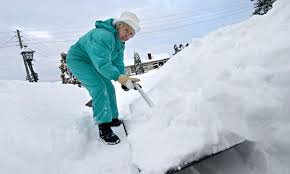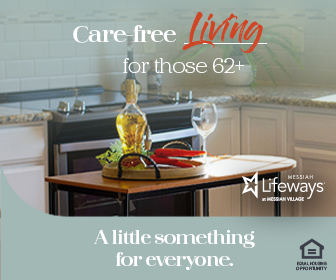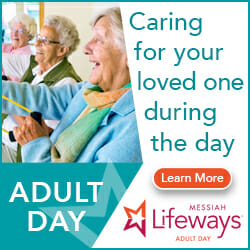Though Central PA has received a fair amount of snow over the last week, we can be thankful we are not getting hammered like New York and the New England Coast from Winter Storm Juno. Nonetheless, no matter what the snow totals are in your area, we all need to be cautious and smart when battling the elements.
Conditions like these are hazardous for anyone, but they can be downright dangerous for older adults. Along with cardiac issues exacerbated by cold weather exertion, hip, wrist, and ankle fractures during the winter months are quite common. In my experience from days as admissions director for Messiah Village, our Wagner transitional rehab would often see a rise in slip and fall fractures, particularly after foul-weather events. These injuries can also have some dire consequences in the elderly. According to the US National Library of Medicine it is estimated that the death rate in the elderly is as high 30% for up to a year following complications from a hip fracture. So it’s very important for seniors to be careful about falling or suffering injuries while shoveling snow. A study from the National Electronic Injury Surveillance System (NEISS), taken from AARP.org, estimates that 11,500 people (all ages) are sent to the emergency room each year with snow-shoveling injuries, and those 55 or older are four times more likely to suffer cardiac-related symptoms than are younger adults. “The cardiovascular demands of snow shoveling are increased by the freezing temperatures that typically accompany snowfall,” said the study’s senior-author, Gary Smith, MD, DrPH, director of the Center for Injury Research and Policy. “Not only is the heart’s workload increased due to shoveling snow, but cold temperatures also add to the chances of a heart attack in at-risk individuals.” Furthermore, some older adults that may already have some mobility issues could become more at risk of falling while venturing out or they may just withdraw into their homes for the winter altogether. Either scenario is not good.
Minimize Risk
So what can we do to avoid these risks? Orthopaedic surgeon James Gladstone, M.D., co-chief of sports medicine at New York’s Icahn School of Medicine at Mount Sinai, offers these tips for staying safely on your feet:
• Do the shuffle. If you must walk on ice, walking in a shuffle or moving your feet only slightly apart provides better balance than your normal stride. Bending your knees just slightly as you walk will also help you keep your balance.
• Walk sideways on inclines. When walking on an icy incline such as a driveway, turn sideways. Then walk in side steps, by taking a step and bringing your other foot up to meet your lead foot, instead of your usual gait of one foot in front of the other. Walking this way while also slightly bending your knees will give you more balance and stability.
• Watch out for icy patches. Take care when exiting cars, buses and trains or when walking up and down outdoor stairs. Keep your eyes open for patches of ice.
Have someone check the safety of walkways before you venture out and be sure they have shoveled, salted or secured the path for you to safely travel on.
If you must shovel snow, here are some tips for doing it safely:
• Warm up your muscles. Shoveling is a vigorous activity. Before you go outside, warm up your muscles with some light exercise for 10 minutes.
• Push, don’t lift. Push the snow to the side as much as possible, instead of lifting it. If you must lift, do it properly. Squat with your legs apart, knees bent and back straight. Lift with your legs. Do not bend at the waist.
• Think small scoops. Small amounts of snow are easier to lift, and you’re less likely to strain your back. Never hold a shovelful of snow with your arms outstretched — it puts too much weight on your spine.
• Avoid twisting. Do not throw the snow over your shoulder or to the side. This requires a twisting motion that stresses your back.
Get Some Helping Hands
Another tip is to ask for help or hire help to deal with the challenges that winter weather poses, whether it’s shoveling or simply walking or driving from icy point A to slippery point B. You can hire help for many different chores or needs, and not just for snow removal. Several of the more treacherous places for icy and slushy conditions are sidewalks and parking lots. Many home care agencies like Messiah Lifeways At Home can help alleviate the risk involved. They can provide door-to-door transportation to and from appointments, go grocery shopping or run errands for you, and even take Fluffy or Fido out for a walk. Having this type of help can be a life saver, literally.
Lastly, if you have an elderly neighbor or loved one you are concerned about, please check in on them on a regular basis. Make sure they have a proper heating source, food and water, their medications are filled and they can get out of the house in case of an emergency. So this winter, be safe, be smart, and stay away from the emergency room.
If you’d like more information about staying safe this winter, please contact the Messiah Lifeways Coaching office at 717-591-7225 or email coach@messiahlifeways.org. To contact Messiah Lifeways At Home directly, call 717-790-8209.






